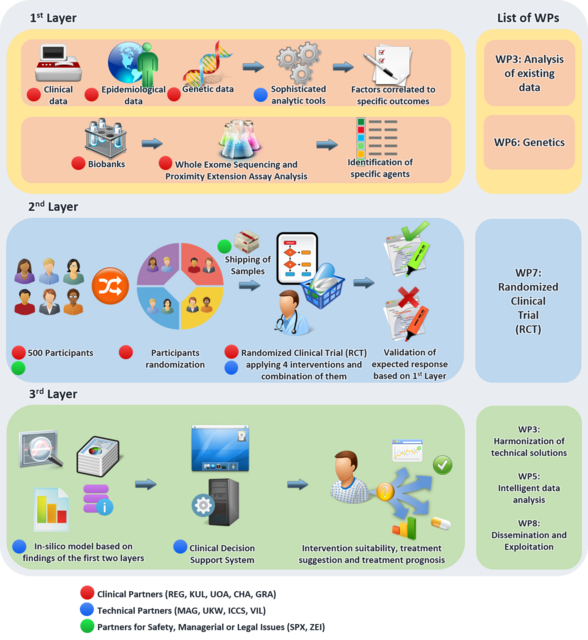UNITI
Unification of treatments and Interventions for Tinnitus patients
Coordinator UNITI : | Winfried Schlee, University of Regensburg, Germany |
Coordination of WP 4 (harmonisation of technical solutions): | |
Founder: | European Union Research and Innovation programme Horizon 2020 |
Status: | Duration 39 months, start date 01 Jan 2020, grant number 848261 |
Description
Tinnitus is the perception of a phantom sound and the patient’s reaction to it. Tinnitus remains a scientific and clinical enigma of iTinnitus is the perception of a phantom sound and the patient’s reaction to it. Although much progress has been made, tinnitus remains a scientific and clinical enigma of high prevalence and high economic burden. It affects more than 10% of the general population, whereas 1% of the population considers tinnitus their major health issue. Recent cohort studies show that tinnitus prevalence tends to increase over time and with older age. Assuming that there is no cure to be found, the prevalence estimates in Europe would double by 2050. A large variety of patient characteristics - including genotyping, aetiology, and phenotyping - are poorly understood, because integrated systems approaches are still missing to correlate patient`s characteristics to predict responses to combinatorial therapies.
Although genetic causes of tinnitus have been neglected for decades, recent findings of genetic analysis in specific subgroups (gender and phenotype) have highlighted that bilateral tinnitus in men reached a heritability of 0.68. This heritability is close to autism, schizophrenia and Attention Deficit Hyperactive Disorder (ADHD). There is no current consensus on tinnitus treatment. UNITI’s overall aim is to deliver a predictive computational model based on existing and longitudinal data attempting to address the question which treatment approach is optimal for a specific patient based on specific parameters. Clinical, epidemiological, medical, genetic and audiological data, including signals reflecting ear-brain communication, will be analysed from existing databases. Predictive factors for different patient groups will be extracted and their prognostic relevance will be tested in a randomized controlled trial (RCT) in which different groups of patients will undergo a combination of therapies targeting the auditory and central nervous systems.
Work Packages
| Workpackage | Content | Responsibility |
| WP1 | Ethics | University of Regensburg (UHREG) |
| WP2 | Project Management | University of Regensburg (REG) |
| WP3 | Analysis of existing data | University of Magdeburg (MAG) |
| WP4 | Harmonization of technical solutions | Julius-Maximilians-Universität Würzburg (JMU) |
| WP5 | Intelligent data analysis | ICCS |
| WP6 | Genetics | GRA |
| WP7 | Randomized Clinical Trial | University of Regensburg (REG) |
| WP8 | Dissemination, Communication and Exploitation | VIL |
Overview
Partners
| No | Name | Short name | Country | Project entry month | Project exit month |
1. | KLINIKUM DER UNIVERSITAET REGENSBURG | UHREG | Germany | 1 | 39 |
2. | KATHOLIEKE UNIVERSITEIT LEUVEN | KUL | Belgium | 1 | 39 |
3. | ETHNIKO KAI KAPODISTRIAKO PANEPISTIMIO ATHINON | UOA | Greece | 1 | 39 |
4. | CHARITE - UNIVERSITAETSMEDIZIN BERLIN | CHA | Germany | 1 | 39 |
5. | SERVICIO ANDALUZ DE SALUD | GRA | Spain | 1 | 39 |
6. | KAROLINSKA INSTITUTET | KI | Sweden | 1 | 39 |
7. | OTTO-VON-GUERICKE-UNIVERSITAET MAGDEBURG | MAG | Germany | 1 | 39 |
8. | UNIVERSITAETSKLINIKUM WUERZBURG - KLINIKUM DER BAYERISCHEN JULIUS-MAXIMILIANS- UNIVERSITAET | JMU | Germany | 1 | 39 |
9. | INSTITUTE OF COMMUNICATION AND COMPUTER SYSTEMS | ICCS | Greece | 1 | 39 |
10. | ISTITUTO DI RICERCHE FARMACOLOGICHE MARIO NEGRI | MIL | Italy | 1 | 39 |
11. | VILABS (CY) LTD | VIL | Cyprus | 1 | 39 |
12. | SPHYNX TECHNOLOGY SOLUTIONS AG | SPX | Switzerland | 1 | 39 |
13. | ZEINCRO EGESZSEGUGYI SZOLGALTATO KORLATOLT FELELOSSEGU TARSASAG | ZEI | Hungary | 1 | 39 |








